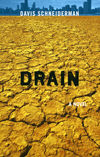Drain
Davis Schneiderman vividly creates a desolate and backward futuristic word in his novel Drain – a world that is made all the more terrifying for its uncanny resemblance to our own. Part sci-fi/fantasy (though certainly not the kind you want your kids to read), part psychological thriller, and part commentary on contemporary religion and politics, Drain follows numerous paths and occasionally fights the urge to draw extraneous ideas into its already-teeming domain.
Davis Schneiderman vividly creates a desolate and backward futuristic word in his novel Drain – a world that is made all the more terrifying for its uncanny resemblance to our own. Part sci-fi/fantasy (though certainly not the kind you want your kids to read), part psychological thriller, and part commentary on contemporary religion and politics, Drain follows numerous paths and occasionally fights the urge to draw extraneous ideas into its already-teeming domain.
Schneiderman’s prose is nothing if not ambitious, relentlessly pursuing with a thunderous style, sustaining a frenetic pace that releases you only for the split-second it takes to turn the page. It is both captivating and unsettling, successfully conveying the panic and urgency the characters experience in a world that wilts around them while they struggle to survive at any cost, even if it means sacrificing their humanity.
The world of Drain is a parched, crumbling, yellowed one in which all the water in Lake Michigan has mysteriously vanished, wealthy development corporations scramble to capitalize on the country’s unfortunates, and rampant superstition is the gospel of the day. This environment fosters a return to the primitive, where higher functioning can no longer even hope to triumph over base instincts, and generation after generation succumbs to either predatory opportunists or old fashioned street thugs who make today’s criminals look like choir boys and girl scouts.
These bullies, who are nothing but kids, run in a gang called The Blackout Angels and unleash the most sadistic, sexually perverse terrorism onto their backward victims, punishing them for their perceived stupidity. Schneiderman doesn’t shy away from conveying this violence to the very last gruesome detail. He even opens the book by describing one of the Angels’ rampages, as if he is trying to prepare the reader for what s/he is in for: “Tape the mouth. Cover the head in a nylon sack. Stick a bondage ball down the throat and hog-tie the little bitch.” You should prepare yourself, all right. This is about the least perverse it gets, as Schneiderman takes you along his schizophrenic ride. Though his frantic storytelling style sometimes sacrifices clarity for cleverness and packs a bit too much into the book’s short space, his characters are bizarrely sympathetic despite their depravity, and he manages to write an entire novel as though it is a rant.





